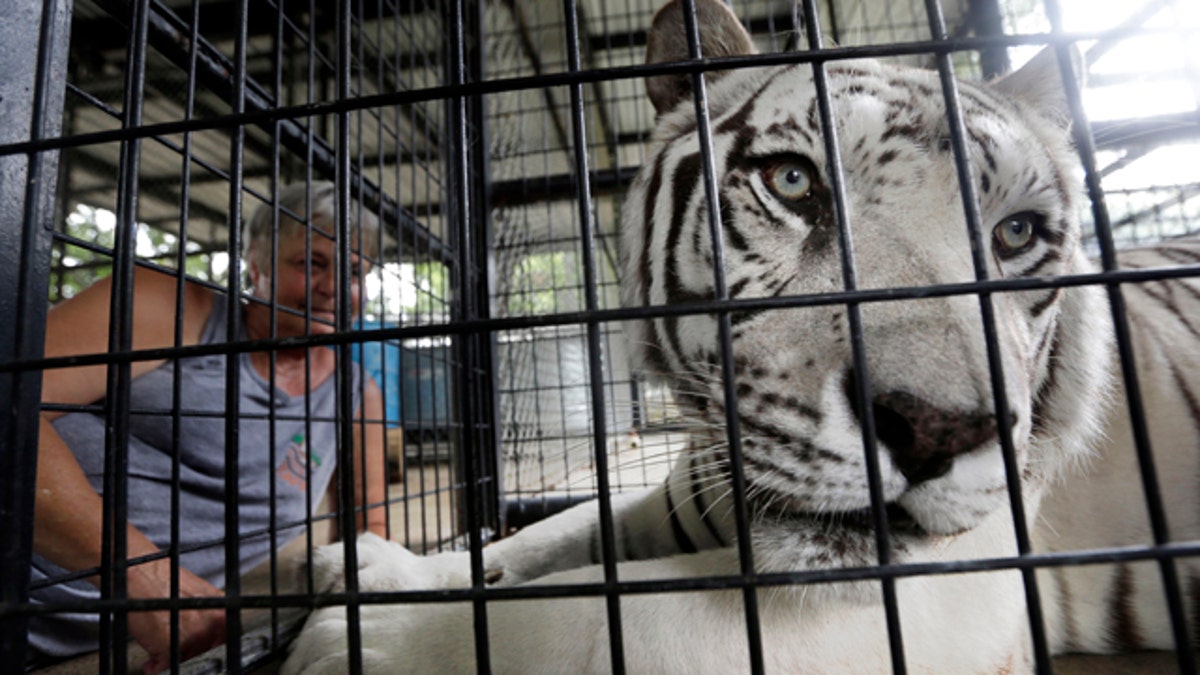
July 25, 2013: A tiger suffering from distemper is calmed before a blood draw at the In-Sync Exotics Wildlife Rescue and Education Center in Wylie, Texas. (ap)
WYLIE, Texas – Apollo was his usual friendly self at feeding time, even though the 12-year-old tiger was fighting a virus that had sickened numerous big cats at his North Texas animal sanctuary.
But hours later, he had a seizure and died.
Four more tigers and a lioness soon suffered the same fates in an outbreak that the refuge's founder calls "an absolute living nightmare."
More than a dozen lions and tigers are still suffering from canine distemper at the In-Sync Exotics Wildlife Rescue and Education Center in Wylie.
The outbreak of the virus -- which has no cure and is usually associated with dogs -- was discovered in late May at the refuge about 30 miles northeast of Dallas
"I can be looking at them one day and be thinking they're OK, and the next day they have a seizure and die," said the center's founder, Vicky Keahey. Refuge spokeswoman Lisa Williams added: "We just have to give them the best supportive care we can and hope that their bodies can fight it."
Experts believe raccoons likely started the outbreak by crawling around the huge outdoor cages that house more than 50 lions, tigers, cougars, bobcats and other cats. The virus can progress from respiratory and digestive issues to neurological problems.
Researchers discovered about 30 years ago that the virus, which can afflict many different species, could infect big cats, said Claire Sharp, assistant professor of clinical sciences at Tufts University's Cummings School of Veterinary Medicine. Outbreaks have included one in Tanzania's Serengeti National Park in 1994 that killed a third of its 3,000 lions.
Although there are vaccines for dogs and ferrets, studies have shown the dog vaccine isn't safe for big cats and no evidence the ferret vaccine is effective in big cats, Sharp said. Williams said the ferret vaccine was given to animals at her refuge that weren't showing symptoms, though five of the six that died were among those vaccinated.
Workers at the Texas refuge have been collecting information to help scientists learn more about the virus while trying to nurse ill animals back to health. The refuge remains open, and experts say the virus poses no threat to humans.
Within 10 days of Apollo's death on July 7, three more big cats had died: a lioness named Layla and two tigers, Abrams, named after the military tank, and his brother Harley, "a gigantic goofball," Williams said. Lucca, a tigress who Williams said would listen with paws crossed as she read to her, was euthanized Aug. 8, followed three days later by the death of Kazuri, who Williams said had a penchant for hide-and-seek.
"You do get very, very attached to them," Williams tearfully said while standing by a memorial set up for one of the tigers.
The refuge's outbreak is being studied by Sharp and scientists at Boston University.
"There's definitely something different about what happens when this virus gets into the system of a big cat as opposed to other species but we don't really know what that is," Sharp said.
Sharman Hoppes, who teaches zoological medicine at Texas A&M University, said the virus can cause fatal neurological problems in dogs even after the animals appearing to recover. But it's not known if that could happen to big cats.
"Based on dogs, there's certainly the risk of a recurrent disease later on in life," said Hoppes, who the refuge has been consulting.
The refuge takes in abused, neglected and unwanted animals, many from breeding or entertainment facilities or private owners who can no longer care for them. The refuge has been operating at a nonprofit since 2000.
Williams said she doesn't know what to expect from the still-ailing cats.
"It'll be a long time before we can say we're out of the woods with any of them," she said.

